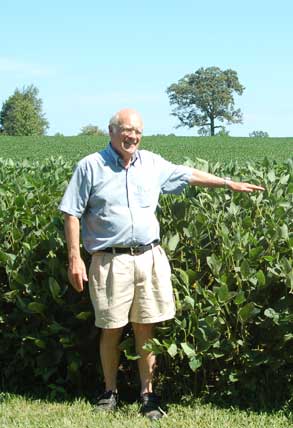Modern farming yields rewards
Published 2:34 pm Thursday, August 20, 2015

- Woodfin Ligon points to a field of soybeans planted by local farmer Robert Womack. “Ideal weather” was the major factor for the tall beans.
A 40-acre field of five-foot soybeans reflects Cumberland farmer Robert Womack’s view of a time-honored profession. A third-generation farmer, Womack knows that in today’s world of agriculture bigger is better.
“I have 200 acres in soybeans this year,” he said.
That figure includes the 40 acres planted on Woodfin Ligon’s land on River Road.
Diversification, he believes, is the key to success.
“I rent land over four or five miles,” Womack said. “The weather isn’t like it used to be. Seems like 15 years ago when it rained here, everybody got rain. Now some fields get rain while others don’t.”
In addition to soybeans, Womack grows wheat and fescue for hay and operates six chicken houses on his home farm, also on River Road.
As for the five-foot soybeans, Womack has a simple answer.
“The number one reason was the weather,” he said. “That field had perfect rain at the right time, and it was not too hot this year.”
The field was fertilized with chicken litter.
“It’s from when the houses are completely cleaned out,” he said.
Womack added that tall soybean plants are not always a good indication of yield.
“From a farmer’s perspective, tall soybeans mean less product, but this year had ideal growing conditions,” Womack said. “Mother Nature told those beans to keep on growing — and they did!”
Last year a similar soybean crop on Ligon’s farm produced 55 bushels per acre, well above the average 40 bushels per acre reported in 2014 by the Virginia Department of Agriculture and Consumer Services.
That harvest, Womack pointed out, is not all profit. Labor notwithstanding, the cost of the Asgrow soybeans Womack plants is $80 for “enough to plant not quite an acre.”
Managing those acres, Womack believes, is a major part of modern agriculture. At the age of 42, he considers himself among the younger generation of farmers.
“My grandfather started this farm and passed it down,” Womack said. “Then it was handed down to me.”
Farming, Womack readily admits, is in his blood.
“Farming is a lot of long hours, but it’s the best way to raise a family,” he said. “I hope the day doesn’t come when we have to depend on other countries for our food. Products from the United States are the best!”





